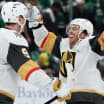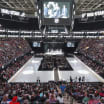What a sight it must have been to Crosby. What a sight it must have been to see rookie forward Bryan Rust, who scored each Pittsburgh goal in Game 7, being engulfed by reporters. What a sight it must have been to see his boss, former landlord and Penguins great Mario Lemieux go up to Rust, shake his hand and congratulate him. What an experience that must have been for Rust.
Crosby and the Penguins are four victories from winning the Stanley Cup for the first time since 2009. Players and teams wait way longer than seven years to get another chance. Some don't get one at all.
But don't blame Crosby if these seven years, filled with career-threatening concussions and coaching changes and management changes, felt like an eternity.
"Having gone through a couple of those early on, 20 and 21 years old, playing the Final, I think you have more of an appreciation for it now," Crosby said. "Just love the opportunity to be able to get back."
The best thing about Crosby and the Penguins is how they made their return. This is a new group with a new coach that had to set a new standard for how this team needed to play.
The Penguins were slow at the start of the season, so they weren't good. They gradually became faster after Mike Sullivan took over behind the bench for Mike Johnston on Dec. 12. They established a style that fit the pieces they either had or eventually would acquire.
They went 33-16-5 after Sullivan took over, an impressive record that grows in stature when you consider they lost the first four games he coached. They were 14-2-0 in their last 16 games of the regular season, including 15 without Evgeni Malkin. They're 12-6 in the Stanley Cup Playoffs.
It's all because they play fast and get contributions throughout the lineup. The blueprint was on display in Game 7.
The Penguins smothered the Lightning and outshot them 39-17 to finish the series with a 269-179 advantage in shots on goal.


















